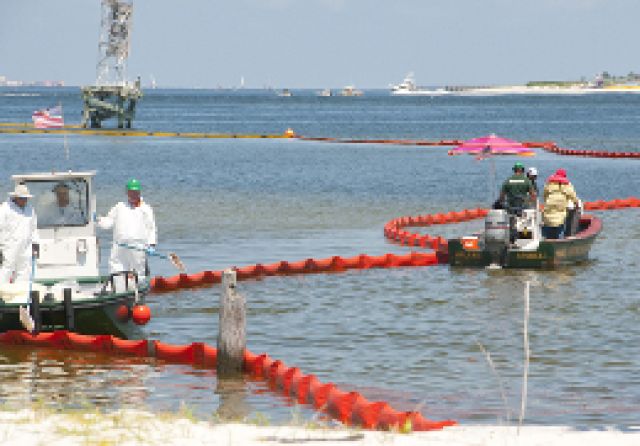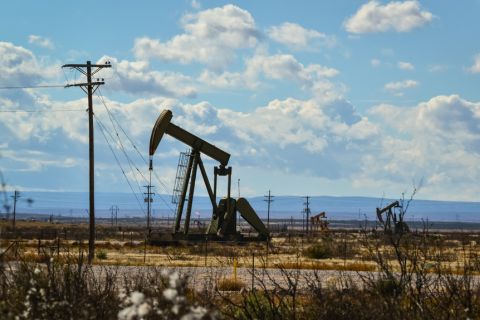
BP has agreed to pay US $4.5 billion and plead guilty to 12 felony and two misdemeanor counts in connection with the April 2010 Deepwater Horizon accident that left 11 people dead, harmed the environment, and led to revamped safety practices in the Gulf of Mexico (GoM).
The agreements reached with the US government, announced Nov. 15, include $525 million payable over three years to resolve Securities and Exchange Commission (SEC) claims. The deal brings to an end the Deepwater Horizon-related claims brought by the SEC, BP said in a prepared statement. But the terms must still get court approval.
The criminal charges include 11 felony counts of misconduct or neglect of ships officers concerning the 11 lives lost, one felony count of obstruction of Congress concerning flow rate estimates, one misdemeanor count under the Clean Water Act, and one misdemeanor count under the Migratory Bird Treaty Act. The $4 billion in fines to resolve US Department of Justice claims include about $1.3 billion in criminal fines, all of which will be paid during a five-year period. The criminal fine amounts to the highest such fine in US history.
“All of us at BP deeply regret the tragic loss of life caused by the Deepwater Horizon accident as well as the impact of the spill on the Gulf Coast region,” Bob Dudley, BP’s Group chief executive, said in a statement. “From the outset, we stepped up by responding to the spill, paying legitimate claims, and funding restoration efforts in the Gulf. We apologize for our role in the accident, and as today’s resolution with the US government further reflects, we have accepted responsibility for our actions.”
The statement came hours before the US Justice Department announced the unsealing of a 23-count indictment charging the two highest-ranking BP supervisors onboard the Deepwater Horizon with manslaughter and violation of the Clean Water Act. The indictment brings charges of negligence and gross negligence.
Assistant Attorney General Lanny A. Breuer, speaking during a news conference in New Orleans, said another indictment charges David Rainey, former senior BP executive, with obstructing a congressional investigation and making false statements to law enforcement officials.
BP lied and withheld documents, making it appear as if there was less damage to the environment, and Rainey lied to Congress and others to make the spill appear less catastrophic, Breuer added.
“The explosion of the rig was a disaster that resulted from BP’s culture of privileging profit over prudence, and we allege that BP’s most senior decision makers onboard the Deepwater Horizon negligently caused the explosion,” he said.
In wake of the accident, BP implemented enhanced safety practices that include requiring dynamically positioned drill rigs to have at least two blind shear rams and a casing shear ram within the subsea blowout preventer (BOP). The requirement enhances reliability in cutting the drill pipe and sealing the well during blowouts, according to BP’s website.
BP also has implemented new standards for maintaining and testing BOPs, worked to improve oversight of cementing services, introduced a new well start-up procedure, and created a deepwater well capping package that is transportable, among a slew of other safety efforts.
Moreover, the company implemented all of the recommendations made as a result of an investigation into the accident as well as made personnel changes, reorganized its upstream business, created a centralized Safety and Operational Risk organization, and adopted new GoM deepwater drilling standards, the company said.
“Since the spill, we have worked hard to rebuild confidence in the company,” Dudley said. “We take seriously not only our commitment to safety and operational excellence but also our communications with stakeholders, including the public, the government, and our investors.”
The company also has agreed to take additional safety steps as part of the agreement.
“These requirements relate to BP’s risk management processes, such as third-party auditing and verification, training, and well control equipment and processes such as blowout preventers and cementing,” according to the BP news release. “In addition, BP has agreed to several initiatives with academia and regulators to develop new technologies related to deepwater drilling safety. “
US Attorney General Eric Holder said BP will retain a monitor to oversee safety, risk management, and equipment maintenance concerning drilling in the GoM’s deep waters for four years. An independent auditor also will conduct annual compliance reviews, and BP must hire an ethics monitor to “improve its code of conduct and foster robust cooperation with the government.”
The agreement does not close the door on all Deepwater Horizon-related claims. BP said it plans to defend itself against remaining civil claims, contesting gross negligence allegations.
To date, BP said it has spent more than $14 billion in operational response and clean-up costs; established a $20 billion trust for claims, settlements and other costs; committed $1 billion to early restoration projects; and paid more than $9 billion to individuals, businesses, and government entities.
Contact the author, Velda Addison, at vaddison@hartenergy.com.
Recommended Reading
Enterprise’s SPOT Deepwater Port Struggles for Customers
2024-04-25 - Years of regulatory delays, a loss of commercial backers and slowing U.S. shale production has Enterprise Products Partners’ Sea Port Oil Terminal and rival projects without secured customers, energy industry executives say.
Range Resources Holds Production Steady in 1Q 2024
2024-04-24 - NGLs are providing a boost for Range Resources as the company waits for natural gas demand to rebound.
EQT Sees Clear Path to $5B in Potential Divestments
2024-04-24 - EQT Corp. executives said that an April deal with Equinor has been a catalyst for talks with potential buyers as the company looks to shed debt for its Equitrans Midstream acquisition.
Novo II Reloads, Aims for Delaware Deals After $1.5B Exit Last Year
2024-04-24 - After Novo I sold its Delaware Basin position for $1.5 billion last year, Novo Oil & Gas II is reloading with EnCap backing and aiming for more Delaware deals.
Matador Hoards Dry Powder for Potential M&A, Adds Delaware Acreage
2024-04-24 - Delaware-focused E&P Matador Resources is growing oil production, expanding midstream capacity, keeping debt low and hunting for M&A opportunities.




